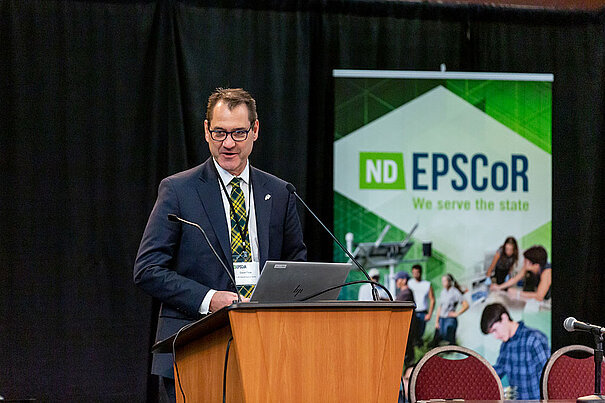
NDSU President David Cook talks at the North Dakota Established Program to Stimulate Competitive Research annual conference.
More than 200 academic and aspiring scientists from the North Dakota University System attended the North Dakota Established Program to Stimulate Competitive Research annual conference on March 29 in Fargo.
The conference unveiled many of the momentous strides ND EPSCoR has made to broaden and diversify pathways into the STEM workforce, support and grow statewide research efforts and promote the value STEM generates for North Dakota.
To dignify and show respect to the Indigenous People of North Dakota, NDSU professor and enrolled member of the Northern Cheyenne Hollie Mackey opened the conference by reading the NDSU Land Acknowledgement.
Comments from top North Dakota cultural, political and education leaders followed.
NDSU President David Cook said that his passion for progressive STEM programs like ND EPSCoR is rooted in his own graduate research at Iowa State University and the University of Kansas. He reiterated NDSU’s commitment to being a collaborative resource and partner to all North Dakota universities and tribal colleges on all levels.
Grants from the National Science Foundation help support ND EPSCoR operations, and NSF Program Director John-David Swanson travelled from Washington, D.C., to speak at the event. Discussions with NDSU Vice President of Research and Creative Activity Colleen Fitzgerald, ND EPSCoR Interim Executive Director Jolynne Tschetter and faculty further affirmed ND EPSCoR to be a mission-driven, forward-thinking partner to STEM education and a solid NSF investment.
Panel discussions with ND EPSCoR leaders and a keynote address presented by Partnering Anthropology with Science and Technology founder and president Annalies Corbin.
Corbin, who is based in Ohio and travels the nation advising organizations how to achieve NSF-oriented goals, applauded ND EPSCoR participants by saying that the North Dakota conference was the first she had seen so many scientists “gelled together” in their projects and as one entity rather than agents of separate institutions. ND EPSCoR should be considered a model for collaborative research and resource optimization, she said.
The panels included an overview of discoveries by ND EPSCoR scientists, tribal community colleges’ research and development needs, and STEM’s outreach opportunities.
Three tribal community colleges operate in North Dakota and including them in discussions from the get-go is an ND EPSCoR priority and dedicating a panel session to hear tribal community concerns was and remains necessary.
North Dakota bioscientists utilized the conference a platform to introduce unprecedented research achievements attained through support from the Center for Cellular Biointerfaces in Science and Engineering. Each presentation detailed descriptions of the significant strides to improve North Dakota’s competitive force in biosciences. The CCBSE panel provided scientists the opportunity to present their findings, achievements and visions.
Featured studies investigated multicellular patient-derived organoids (Jiha Kim, NDSU), quantum mechanical and treatment of cancer cell adhesion (Mouhmad Elayyan, UND), progress in growing 3d cultures of MDA-MB-231 cells (Colin Combs, UND) and mechanics and conformational changes of integrins at the molecular scale (Hanmant Gaiwad, NDSU).
Corbin’s presentation, Project Accessibility: A Conversation about Demystifying Science, addressed how STEM can close the existing disconnect by encouraging educators and policymakers to incorporate opportunities for youth to see the utility of the scientific content being taught. Without those partnerships, Corbin says the educational system will remain top heavy with content and continue neglecting youth the opportunity to see the utility of the content and thereby the awareness required to become interested and pursue STEM-related careers.
Despite the different topics, discussions revealed the overall consensus that STEM has an urgent need yet significant opportunity to create and sustain the community-minded partnerships required to cultivate enthusiasm for STEM education.
The 2024 annual conference is slated for Grand Forks.